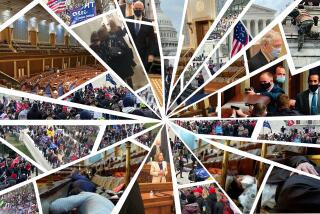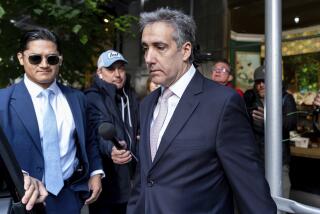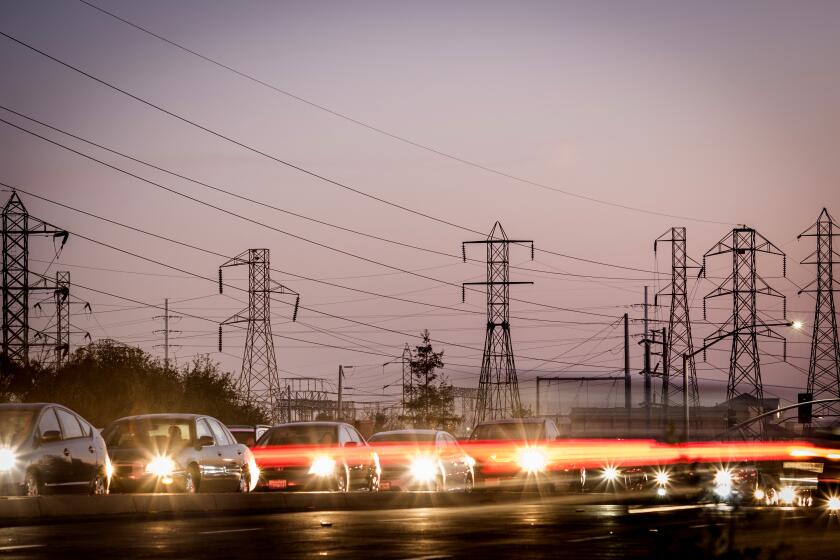Hot Ticket: The Political Swoon Over Bill Bradley
At least in one respect, politics is a lot like real life: People always want what they can’t have.
As the object of what amounts to a national political crush, Sen. Bill Bradley (D-N.J.), is learning something about this. Bradley will be swooping into California later this week for a series of fund-raisers, including a $1,500-a-couple gathering sponsored by two Hollywood heavies, Michael D. Eisner of the Walt Disney Co. and Michael Ovitz of the Creative Artists Agency.
The event has raised eyebrows throughout the political community here because Eisner and Ovitz are not known for flagging down politicians with their checkbooks. For Bradley to line up both is considered a coup. Eisner, a New York City native, has been a fan of Bradley’s from the time he played professional basketball with the New York Knicks, and was an early backer of his political career. Ovitz, who was involved on the periphery of Gary Hart’s 1984 presidential campaign, was recruited by Eisner.
Neither would discuss why they are sponsoring the event for Bradley, but one source who knows both said, “I don’t think you can attribute it to parochial entertainment industry interests. I think what’s crucial to them is that there is this pizazzy quality about Bradley’s thinking and the long-range potential of his leadership.” In other words, they are getting in near the ground floor.
Bradley’s trip has raised eyebrows also because it comes just as the first wave of Democratic presidential candidates are descending on Los Angeles, hands outstretched. Officially, the $250,000 Bradley hopes to raise here and in San Francisco will go to his 1990 Senate reelection campaign. But one of his local supporters said “absolutely, one of the reasons for this trip” is to expand the network of California donors that Bradley could tap should he choose to seek the presidency.
In many respects, Bradley is an ideal candidate to mine the Westside community of liberal donors: He’s smart and serious, and somehow stylish in a rumpled way. In person, Bradley doesn’t set off any sparks that might be confused with charisma; though he’s relaxed and engaging in small groups, the kindest thing you can say about his public appearances is that he’s a better after-dinner speaker than most former athletes. But his previous career as a professional basketball player and his stint as a Rhodes scholar have invested him with a kind of sweaty celebrity.
Bradley does have one major problem with the big givers here. Last March, he voted in favor of aid to the Nicaraguan contras, stunning Washington’s liberal community--not to mention many of his constituents, who showered his office with 7,000 letters, almost all opposed to his vote. His position continues to create problems for him within the party; even last week, some local Democratic givers were looking for ways to advertise their disappointment over his switch.
But the uproar over Bradley’s contra vote hasn’t drowned out the chorus of party activists trying to entice him into the presidential race. Al Jackson, political director for the National Committee for an Effective Congress, a prominent liberal organization, said, “A lot of people who worked at the organizer level for Walter Mondale are still looking for a horse in the race to get excited about, and the only horse that excites them is Bill Bradley.”
The only problem is that Bradley refuses to saddle up. He insists he isn’t running for President this time, and he apparently means it.
Bradley seems to understand that he’s attractive partly because he isn’t running. Nowhere does familiarity breed contempt quite so efficiently as in presidential politics. The presidential race is so exhausting and demeaning that those who haven’t entered the hunt always look statesmanlike beside those who are already careening through the course, tattered and bleeding. Over the years, many otherwise sober politicians--Edward M. Kennedy, to name one--have been seduced into presidential quests by this optical illusion, only to find that after their first tumble in the mud they look as grubby and grasping as everyone else.
This year, even more Democrats than usual are wailing about the lack of qualified candidates. There’s some ritual in this, but some merit too. The Democrats are looking at a relatively small field: Only three hopefuls (ex-Sen. Hart of Colorado, former Gov. Bruce E. Babbitt of Arizona and Rep. Richard A. Gephardt of Missouri) have entered the race, and just four more are behind them (the Rev. Jesse Jackson, Sen. Joseph R. Biden of Delaware and Govs. Mario M. Cuomo of New York and Michael S. Dukakis of Massachusetts), some of whom may not run. And, except for Hart, most of these candidates are unfamiliar to the public--and even to much of the party.
Not surprisingly, then, many Democrats yearn for more choices. Bradley is a natural object for their affections. Many Democrats like Bradley because they believe he could attract voters from across the political spectrum. Conservative leaders tend to agree. “Bradley would be the most formidable (Democratic candidate),” Rep. Jack Kemp (R-N.Y.), said last fall. “He’s a pro-Strategic Defense Initiative, pro-trade, pro- contras, growth-oriented Democrat.”
That’s a fine endorsement, whose value is depreciated only by the fact that Kemp and most people who think like him don’t vote in Democratic primaries. It’s also overstated. In their praise of Bradley, Kemp and the conservatives are projecting what they want to see. Bradley isn’t nearly as far from the Democratic liberal mainstream as Kemp implies.
Though conservatives invariably describe Bradley as a supporter of the “Star Wars” initiative, in the last congressional session he voted to ban testing of anti-satellite weapons (reversing an earlier position) and joined a bipartisan effort to reduce SDI funding from President Reagan’s request. On domestic issues--from the environment to the concerns of women--he’s a dependable liberal. His one great apostasy from the prevailing Democratic faith is his support of the Nicaraguan contras.
The contra vote notwithstanding, many of the people who want to see Bradley in the White House argue that 1988 presents his best shot at getting there. Bradley is only 43, but in 1992, there will either be a Democratic President seeking reelection--which would presumably prevent Bradley from running--or a Republican running with the benefit of incumbency. By 1996, a gaggle of younger Democrats will be clamoring for attention--and the tax-reform glow that he’s basking in today will have long faded.
That isn’t bad advice, but Bradley isn’t listening. Bradley has always navigated by his own lights. When he graduated from college, he went to Oxford, though many said it would cost him his basketball career. When his basketball career ended, he ignored offers to run for lower office before winning his Senate seat in 1978. “More than anybody I’ve ever met in this business, he clearly marches to his own drummer,” said Michael Kaye, his media consultant, “and 1988 is not the year he believes he is ready (to seek the presidency). For what he wants to do, and what he wants to learn, and what he wants to accomplish, I don’t think he is there yet. He has his own clock.”
More to Read
Get the L.A. Times Politics newsletter
Deeply reported insights into legislation, politics and policy from Sacramento, Washington and beyond. In your inbox three times per week.
You may occasionally receive promotional content from the Los Angeles Times.






